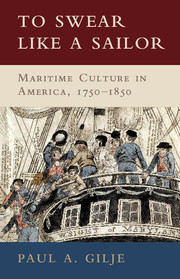Book contents
- Frontmatter
- Dedication
- Contents
- List of Illustrations
- Acknowledgments
- List of Abbreviations
- Introduction
- 1 To Swear Like a Sailor
- 2 The Language of Jack Tar
- 3 The Logbook of Memory
- 4 Spinning Yarns
- 5 Songs of the Sailorman
- 6 The Pirates Own Book
- 7 Tar-Stained Images
- Epilogue: The Sea Chest
- Appendix: A Note on Logbooks and Journals Kept at Sea
- Notes
- Bibliography of Primary Sources
- Index
1 - To Swear Like a Sailor
Published online by Cambridge University Press: 05 February 2016
- Frontmatter
- Dedication
- Contents
- List of Illustrations
- Acknowledgments
- List of Abbreviations
- Introduction
- 1 To Swear Like a Sailor
- 2 The Language of Jack Tar
- 3 The Logbook of Memory
- 4 Spinning Yarns
- 5 Songs of the Sailorman
- 6 The Pirates Own Book
- 7 Tar-Stained Images
- Epilogue: The Sea Chest
- Appendix: A Note on Logbooks and Journals Kept at Sea
- Notes
- Bibliography of Primary Sources
- Index
Summary
Simeon Crowell went to sea sometime in the mid-1790s before he was twenty years old. He sailed first in a New England fishing fleet. Brought up in a Christian home by a widowed mother, Crowell liked to read the Bible and could recite many of its stories from memory. Aboard a fishing schooner on the Grand Banks, however, it was difficult to hold to one's convictions. The other seamen swore constantly, and gradually Crowell began to join them. By his third season on the Banks, Crowell had become an expert in bad language and thought that he might have astonished even some of the old salts with his “wicked conversation” and the many “carnal songs” with which he “diverted the crew at times.” Enjoying the attention and respect he gained, Crowell continued to entertain the crew. Sometimes he recited stories from the Bible – especially from the spicier Old Testament. Other times he sang carnal songs, cursed, and swore.
Unfortunately, Crowell related his experience after he had a religious conversion. As a respected land-based Christian, Crowell was not about to commit sinful utterance to ink and paper. We are left to wonder about the content of the carnal songs and the exact words that comprised “wicked conversation” aboard a fishing schooner on the Grand Banks in the 1790s. Crowell's reluctance was not unusual. We can search journal after journal, and logbook after logbook, and stumble across only a few moments when the oral culture of Jack Tar's cursing was written down. All too often what we get are references to the act of swearing, without the choice words mentioned. During one mutiny on the American privateer Tyrannicide in January 1777 the captain reported that the crew gave him “much ill Language.” When Charles Tyng first went to sea in the early nineteenth century, he “listened with horror to the profane language of the sailors” and was so distressed that “the idea that I was to be a companion with such creatures perfectly shocked” him. Aboard the USS Peacock in 1827 men were punished with the lash for “disrespectful language” and “slandering some of the crew.” In the 1840s Samuel Chase admitted in his journal to using profane language on a whaling cruise to the Indian Ocean, saying that he was relying on such language more than in the previous fifteen years.
- Type
- Chapter
- Information
- To Swear like a SailorMaritime Culture in America, 1750–1850, pp. 9 - 35Publisher: Cambridge University PressPrint publication year: 2016



